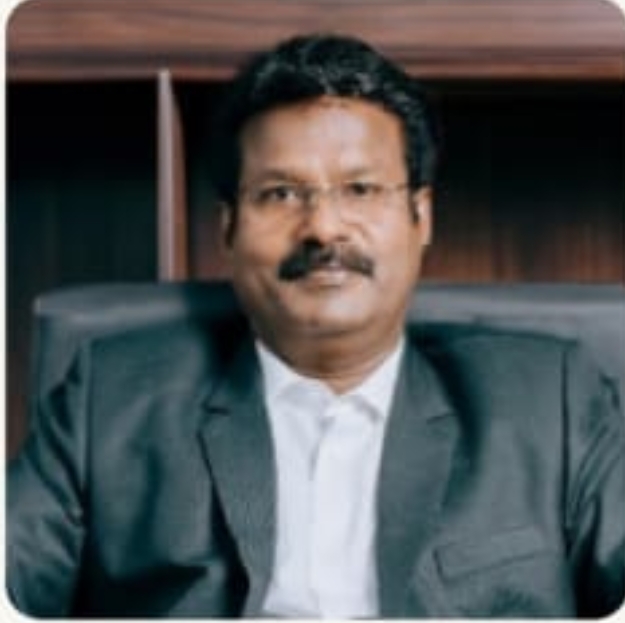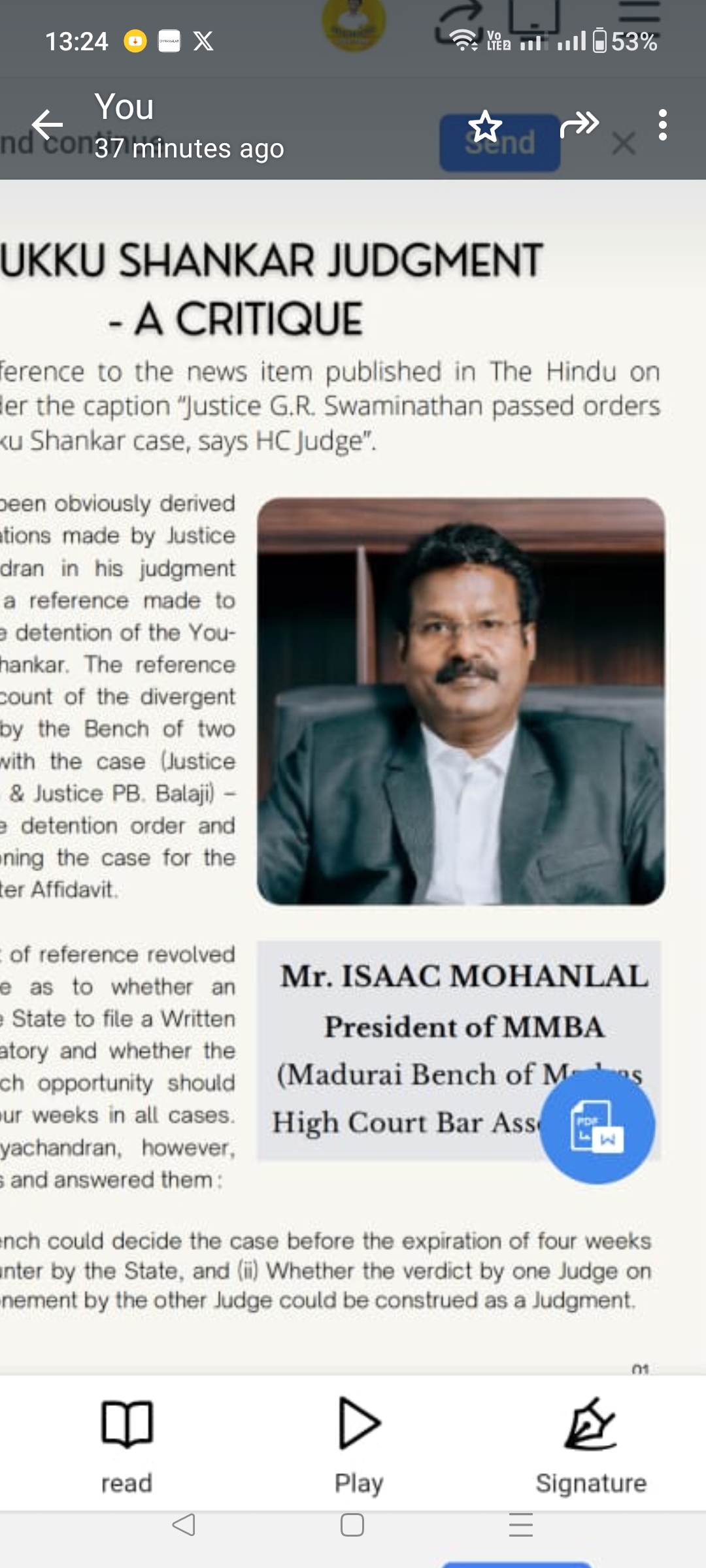MADURAI 12TH JUNE, 2024
This is with reference to the news item published in The Hindu on 11.06.2024 under the caption “Justice G.R. Swaminathan passed orders hastily in Savukku Shankar case, says HC Judge”.
The caption has been obviously derived from the observations made by Justice Dr. G. Jeyachandran in his judgment while answering a reference made to him relating to the detention of the Youtuber Savukku Shankar. The reference happened on account of the divergent decisions given by the Bench of two Judges dealing with the case (Justice GR. Swaminathan & Justice PB. Balaji) – one quashing the detention order and the other postponing the case for the State to file Counter Affidavit.
The primary point of reference revolved
Mr. ISAAC MOHANLAL
around the issue as to whether an opportunity to the State to file a Written President of MMBA
Counter is mandatory and whether the
time limit for such opportunity should (Madurai Bench of Madras necessarily be four weeks in all cases. High Court Bar Association)
Justice Dr. G.Jeyachandran, however, framed two points and answered them :
(i) Whether the Bench could decide the case before the expiration of four weeks and without a Counter by the State, and (ii) Whether the verdict by one Judge on merits and postponement by the other Judge could be construed as a Judgment.
01
Justice Dr. G.Jeyachandran, in fact, concurred with the view expressed by Justice G.R. Swaminathan on the first point namely, the Court can, while issuing rule nisi in a Habeas Corpus petition, fix any reasonable date for the State to file Counter (which could be even earlier than the ordinary 4 weeks), and that such Counter need not necessarily be in writing and can also be by way of oral submission as well.
This is what exactly Justice G.R. Swaminathan did in that case. Justice Dr. G. Jeyachandran himself recorded at para 31 of his judgment that the Additional Advocate General had produced the records and made oral submissions before the Bench. After perusing the records and considering the oral submissions, Justice GR. Swaminathan thought it fit to quash the detention of Savukku Shankar. He took the view that the liberty of a citizen is highly sacrosanct and detention of a person can be legitimate only in the event of an ostensible threat to public order.
But, it looks quite shocking to see why Justice Dr. G. Jeyachandran made scathing remarks against Justice GR. Swaminathan for what he did (which is only in consonance with his own conclusions). The observations are discernably not aimed at the decision but at the Judge personally. Remarks like: failure to afford opportunity to file Counter, and bias of showing interest in passing order hastily without consulting the Bench Partner etc. are wholly unwarranted and unjustified.
It is to be remembered that persons are detained in prison under orders of detention without any trial or conviction. Detention in jail is a gruesome deprivation of the right of free movement which is one of the most sacred of all Fundamental Rights. Detention orders cannot be passed in a routine and perfunctory manner. They must contain valid reasons. Orders of detention would be tested only on the grounds and reasons stated therein. If the order is bad on its face, it cannot be made good by any reasons to be supplemented subsequently by way of Counter Affidavits. This too is an elementary principle of law deep-rooted in our jurisprudence and long-cherished over the years.
If the Courts are not able to come to the rescue of the citizens at the earliest point of time against undeserved detentions and would be waiting for the State to supply reasons later through Counter Affidavits, it would be nothing but an abdication of its constitutional obligation to protect the fundamental rights of the citizens.
02
Justice G.R. Swaminathan rightly remarked that most of the detention cases are decided after the passage of several months. Many are closed as infructuous because of the expiration of the term itself. Some succeed at their fag end without any reparation for the incarceration undergone.
Justice Dr. G. Jeyachandran’s further remark that the Order has been passed hastily without consulting the Bench Partner is again without any basis. What would have transpired between the Judges of the Bench might not be known to a Third Judge. These remarks fall to the floor in the teeth of the statements available in the Order itself. The Junior Judge (Justice P.B. Balaji) is apparently aware of the view taken by the Senior Judge (Justice G.R. Swaminathan). It is evident from the record of proceedings signed by both the Judges on the same day (24.05.2024). They themselves went on record to state that there was no consensus between them, and also directed the Registry to place the matter before the Acting Chief Justice for passing appropriate orders.
There was further consensus between the two Judges in ordering transfer of Savukku Shankar from Coimbatore to the Central Prison at Puzhal. Whatever it be, it shall not be the endeavor of a Third Judge to entertain an inference that the two Judges had no consultation between themselves.
‘Audi alteram partem’ is, no doubt, the first lesson taught in law schools. But, attributing it against a Co-Judge is very scathing and scornful. Before making such caustic comments, one must remember that the same principle of ‘audi alteram partem’ is not available to the other Judge against whom such remarks are so casually made.
Justice G.R. Swaminathan, while registering the fact that two highly placed persons had met him in person and wanted him not to test the detention order on merits, chose not to mention who those two emissaries were and for whom they came. All that they seemed to have said was : don’t decide the case. The learned Judge still proceeded to decide the case. This exhibits his dexterity and highest degree of courage.
Judges should be of sterner stuff. Recusing oneself from a case is purely personal to the Judge. It cannot be suggested by one Judge to another. If the Judge feels that his scale is likely to tilt because of an external exertion, certainly he would recuse. At the same time, if an attempt is made to subdue him and thereby he recuses, he ceases to be a Judge. It shall be the hallmark of a great Judge to go on with the case unhampered by these kinds of external interdicts.
03
Even as Justice GR. Swaminathan did not disclose as to whose emissaries they were, it is not understood on what basis Justice Dr. G. Jeyachandran arrived at the conclusion that there was a semblance of personal bias against the respondent. ‘Bias’ is a very scathing statement. The word is very reviling in judicial parlance. It would disqualify a person from being a Judge. If a Judge is susceptible of bias in one case, he would be deemed to be so in all cases.
Those who use such expressions, particularly against Judges, must necessarily bear in mind its sweeping consequences and wielding ramifications. Judges, especially those in Constitutional Courts, are expected to exercise moral control and judicial restraint in making comments against others. Such disparaging remarks might eventually denigrate the dignity of the Courts and would portray the judicial system in poor light. Institutions are to be weighed above individuals. Judges may come and go, but the institution should live for long, for generations.
The Supreme Court of India, a few years ago, took serious exception to the use of expressions even as mild as “uncharitable” by Judges against one another in the case of S. Kasi v. State reported in 2021 (12) SCC 1 as under :
“We may further notice that learned Single Judge in the impugned judgment had not only breached the judicial discipline but has also referred to an observation made by learned Single Judge in Settu vs State as ‘uncharitable’. All Courts including the High Courts and the Supreme Court have to follow a principle of Comity of Courts. A Bench whether coordinate or larger, has to refrain from making any uncharitable observation on a decision even though delivered by a Bench of a lesser coram. A Bench sitting in a larger coram may be right in overturning a judgment on a question of law, which jurisdiction a Judge sitting in a coordinate Bench does not have. In any case, a Judge sitting in a coordinate Bench or a Larger Bench has no business to make any adverse comment or uncharitable remark on any other judgment. We strongly disapprove the course adopted by the learned Single Judge in the impugned judgment”
Note : The view is purely personal 04

